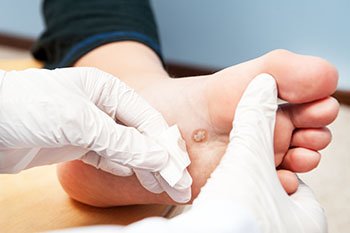Plantar warts are fleshy growths that can appear on the soles of the feet. They are caused by a strain of the human papillomavirus (HPV). Unlike warts that affect other parts of the body, plantar warts are typically flat and cause a buildup of the top layer of skin. These warts may grow inward as the body’s weight puts pressure on the soles of the feet, causing pain. Plantar warts can appear as a single wart or a constellation of multiple warts. They have a rough, grainy texture and small block dots in the middle. Plantar warts are contagious and can spread between individuals. Fortunately, there are a variety of treatments available. If you find a wart on the bottom of your foot, a podiatrist can help find the right treatment for you.
Plantar warts can be very uncomfortable. If you need your feet checked, contact one of our podiatrists from Michigan Foot & Ankle Center. Our doctors will assist you with all of your foot and ankle needs.
About Plantar Warts
Plantar warts are the result of HPV, or human papillomavirus, getting into open wounds on the feet. They are mostly found on the heels or balls of the feet.
While plantar warts are generally harmless, those experiencing excessive pain or those suffering from diabetes or a compromised immune system require immediate medical care. Plantar warts are easily diagnosed, usually through scraping off a bit of rough skin or by getting a biopsy.
Symptoms
- Lesions on the bottom of your feet, usually rough and grainy
- Hard or thick callused spots
- Wart seeds, which are small clotted blood vessels that look like little black spots
- Pain, discomfort, or tenderness of your feet when walking or standing
Treatment
- Freezing
- Electric tool removal
- Laser Treatment
- Topical Creams (prescription only)
- Over-the-counter medications
To help prevent developing plantar warts, avoid walking barefoot over abrasive surfaces that can cause cuts or wounds for HPV to get into. Avoiding direct contact with other warts, as well as not picking or rubbing existing warts, can help prevent the further spread of plantar warts. However, if you think you have developed plantar warts, speak to your podiatrist. He or she can diagnose the warts on your feet and recommend the appropriate treatment options.
If you have any questions please feel free to contact one of our offices located in Livonia, and Southfield, MI . We offer the newest diagnostic and treatment technologies for all your foot and ankle needs.

